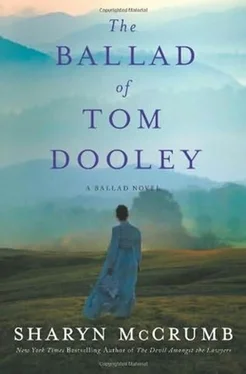When I asked to see her at the jail, I was mindful of doing my bounden duty as her attorney, but I dreaded the encounter, for I imagined some poor weeping wretch, too frightened to speak, clinging to my coat sleeve and begging to be saved from the gallows.
But when the jailer brought her into the interview room, I found that I had done Mrs. Melton the grave injustice of underestimating her. My first impression-which I was careful not to show-was sheer admiration of her beauty, which affected me as I might stand back and appreciate a waterfall or a sunset, without having any desire to possess it. She was beautiful-not in the robust country way of an ordinary farm girl, for that is merely the bloom of youth and animal spirits, and it fades as fast as summer lightning. Ann Melton’s face had the sculpted perfection of Pygmalion’s marble goddess made mortal. Her alabaster skin was offset by smoldering dark eyes and a cloud of black hair that fell in waves about her shoulders. And she carried herself like a duchess, who had, by some error, fallen among ignorant rustics who had rudely imprisoned her. How extraordinary that such a rare creature should have come from an illiterate and shiftless family living in a primitive backwoods cabin in the middle of nowhere. Had she been more fortunate in her circumstances, she could have married a prince, I should think. All those thoughts passed through my mind in the time it took her to enter the room and sit in the chair opposite me across the little pine table in the interview room. No doubt she had been studying me, too, for her glance at me was one of cool appraisal. Here was no weeping wretch, in fear of her life, but rather a cool and disdainful beauty, who took men’s admiration in stride, and who took it for granted that her perfection would spare her the indignities visited upon lesser beings.
“I am sure this is most bewildering to you,” I said, attempting to put her at her ease.
She rolled her eyes and permitted herself a small mocking smile. “I understand it all right. People have been talking all summer, and they figure one of us killed Laura Foster.”
“Or that you did it together.”
“Well, we didn’t.”
“Do you know how Miss Foster met her death?”
She shrugged and looked away. “It’s nothing to do with me-or Tom.”
“Well, there’s no percentage in trying the two of you together, in any case. I intend to request severance in this case. That means that you will each have your own trial.”
She nodded. “Different juries?”
“Yes.”
“And in his trial, you’ll say I did it, and in my trial you’ll say he did it, and we’ll both walk free.”
I blinked. I had expected her to demand that I discover the real killer. “Well, I hope that we may see both of you acquitted of this terrible deed, but I would be remiss in my duty as your lawyer if I did not warn you that if you are convicted, you would be hanged.”
She gave me a pitying smile. “They’ll never put a rope around this pretty neck.”
May 1866
Ever since I found out that I had got the pox, I had been keeping still and listening whenever folks talked about it. They said it takes people in different ways, some faster than others, so I could not know what is in store for me. They said, though, that sometimes the disease poisons the mind, driving the sufferer to madness, and causing him to thrash and rave in a world of delirium until he finally rots from the inside, and dies. That may be a mercy, to be deprived of thinking so that you don’t realize what has become of you. But the future never troubles me overmuch. What I got to wondering about more and more was whether the madness of the pox had anything to equal the lunacy afflicting them that called themselves “in love.”
By the beginning of May, Ann Melton was pacing the floor like a penned-up bull downwind of heifers, and imagining Tom at Laura Foster’s place at any given hour of the day. It was tempting to think that the pox had got to her quick and gone to her head, and I can’t say I would have minded much if it had, but she seemed the same as ever on any subject except Tom. I tried to reason with her a time or two, more to get some peace than to give her any, but she would not be comforted with common sense, so I gave it up, and let her rave.
It didn’t sweeten my day any, though, to have to listen to her carping while I did the chores, sweeping around her feet like as not, and stepping over her to pick up an old bed quilt that had fallen on to the floor, while Ann wept and cursed Tom Dula for the faithless hound that he was.
“I don’t see that he’s changed,” I said once, to shut her up. “He is the same rotter now that he was at fourteen, bedding a married woman, and anybody else who would let him. I don’t see why it’s bothering you now. You’ve had most of your life to get used to the way of him. And you ain’t tied to him, so if he makes you as miserable as all that, you need never see him again. Just stick to your husband, who never gave you a minute of grief, and forget about Tom Dula.”
Ann laughed. “That won’t happen.”
“Likely not. Well, then, if you’re just fuming about his latest dalliance, why, you said yourself that such carryings-on don’t signify nothing to Tom.” Here I paused and pretended to be busy with my sweeping, but all the while watching her out of the corner of my eye. “Unless you think Cousin Laura means more to him than the rest.”
She threw me a look. “’Course not!” she said, as if I had suggested that chickens could talk. “Tom ain’t never loved nobody but me, and he never will. I know that as well as I know my own name. As if he could prefer a scrawny milksop like her over me! He’s just trifling with Laura to pass the time, and to spite me for not dropping everything in my life for him. I reckon he thought I’d go off with him when he came back from the War, and I was so thankful to see him, I might have done it, but if I had, we’d have both starved. I have told him so often enough, but he won’t see sense about that, and it hurt him that I refused to go. I think he minds about it still. That’s how I know that ’tis more spite than devotion that takes Tom over to German’s Hill.”
I shrugged. “Bid him not to go then. If he is as set on you as you claim, he’ll do what you tell him to, won’t he?”
She laughed merrily at that. “What? Tom? Harken to me over a dalliance, when I up and married James Melton without a by-your-leave to him? Why it would just give him that much more joy in doing it, knowing he was paying me back as well.”
I stopped straightening out the tangle of quilts on her bed, and turned to look at her. “Well, if it don’t mean any more than that to him, then why do you care about it?”
She got all quiet then and put her face in her hands. Then she said, so softly that I barely heard her, “Because it wounds me to think about him being with her.”
“You mean like you being with James Melton?”
“That’s different.”
“How?”
“I had to live, didn’t I? Had to get shut of my mama before I ended up like her, with a passel of fatherless young’uns, and nothing to look forward to but the next bottle.”
I shook my head. “Even so, it’s funny to hear you harping on faithfulness, while you are still living with that husband of yours.”
Ann shrugged and turned away. “It’s different. Tom knows.”
***
Spring had finally come to the valley, and I was glad of the warm weather, for I was mortally tired of wearing the same dirty, sweaty clothes all the time, and not getting a chance to wash them. The Melton cabin stank of sweat and chimney smoke and unwashed chamber pots, but now that the days were fine I could go out in the yard and boil the clothes in the kettle, and on warm afternoons, we could leave the doors open and air out the room for a while. I didn’t feel much like giving the place the scrubbing it needed, and if Ann didn’t insist upon it, why, I wouldn’t, but I figured out how to get rid of most of the stench, just to make it livable in there.
Читать дальше












